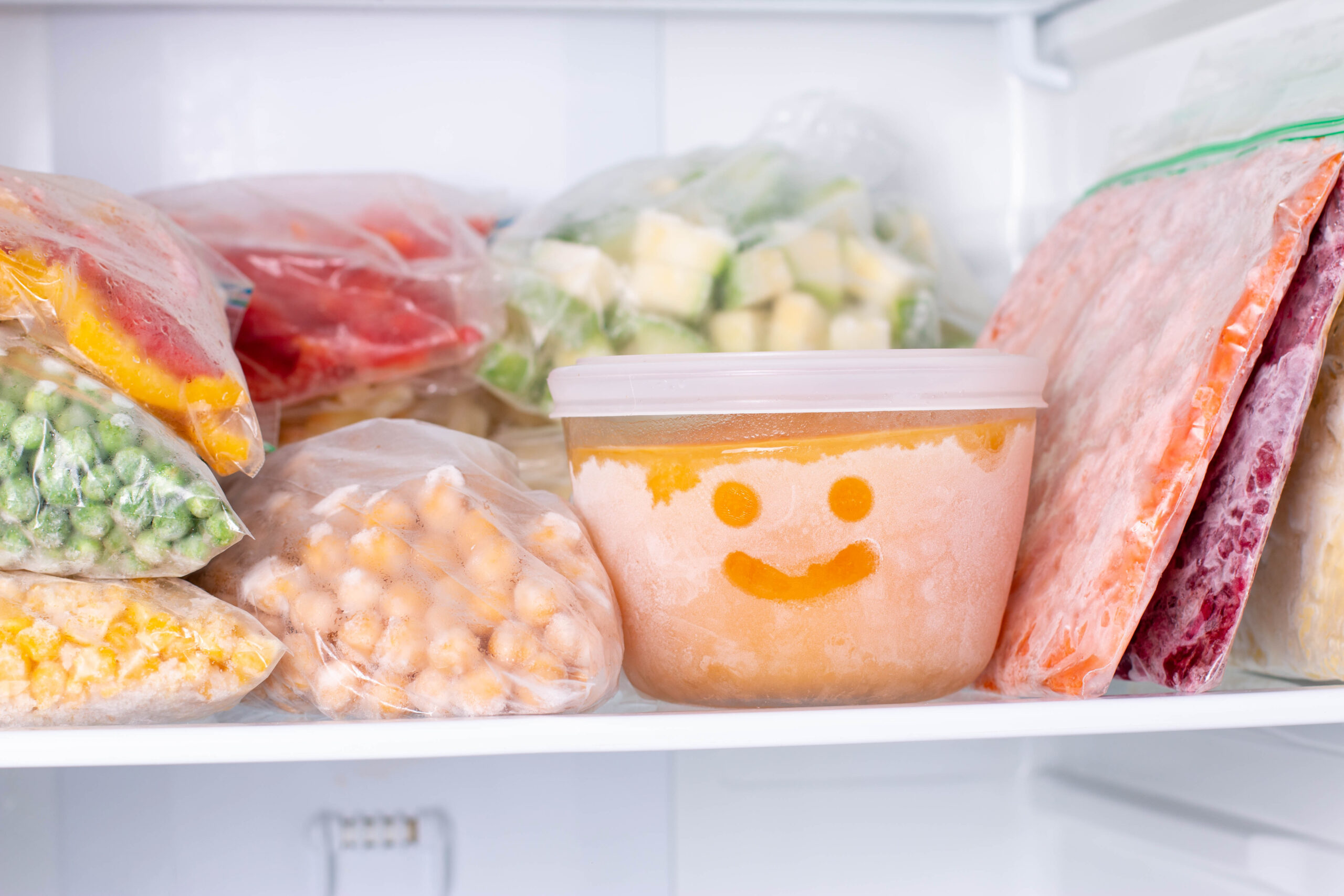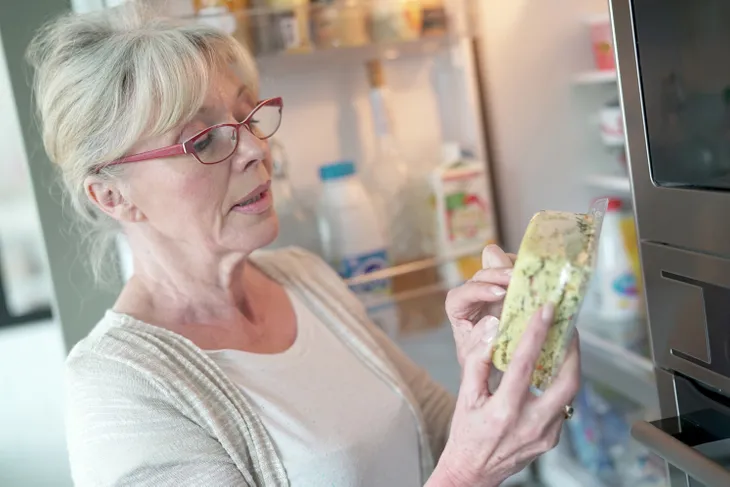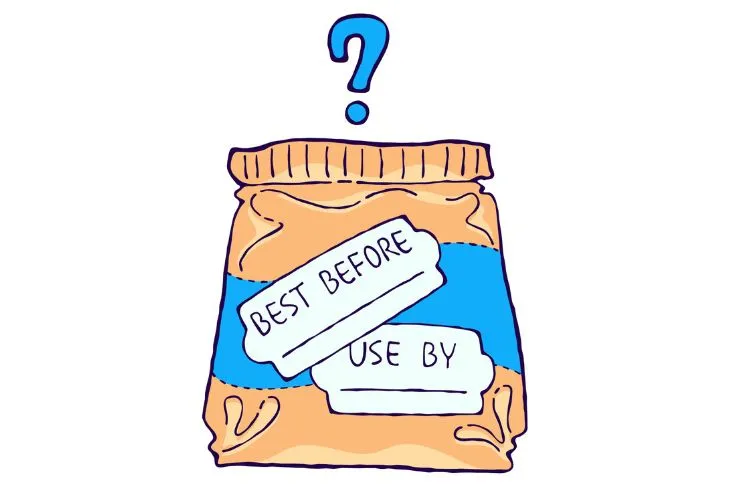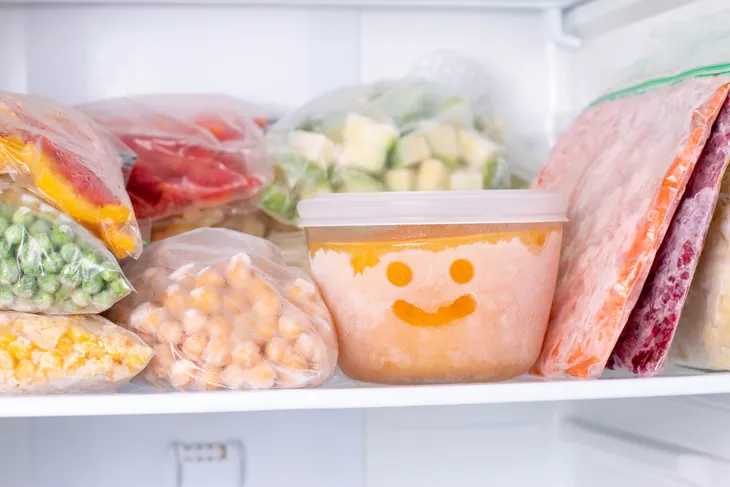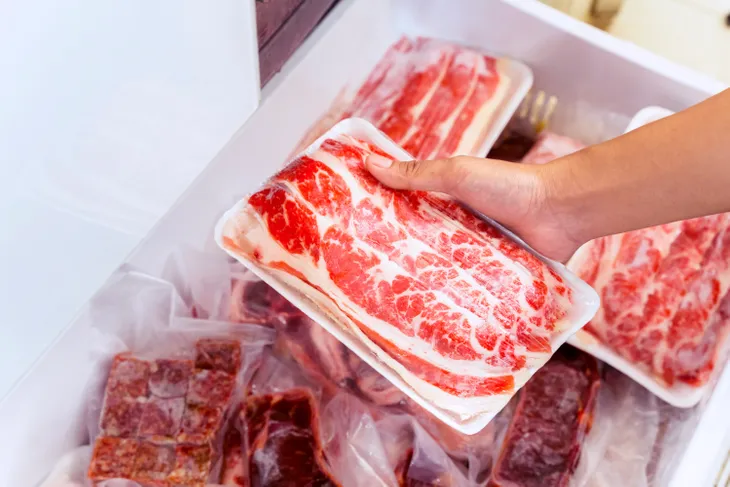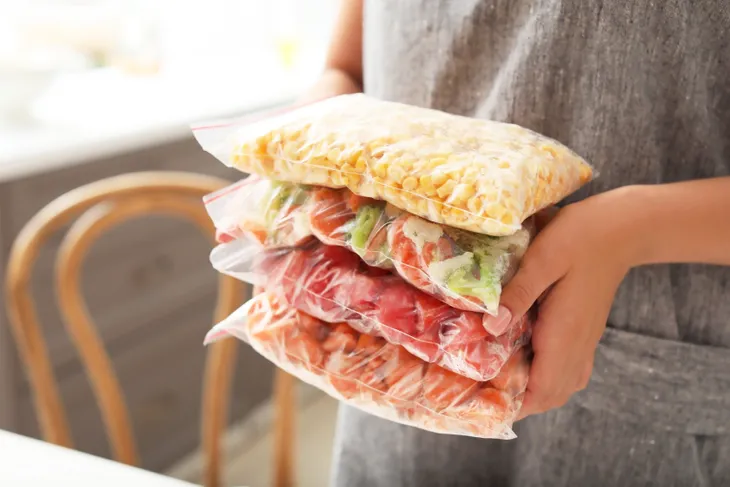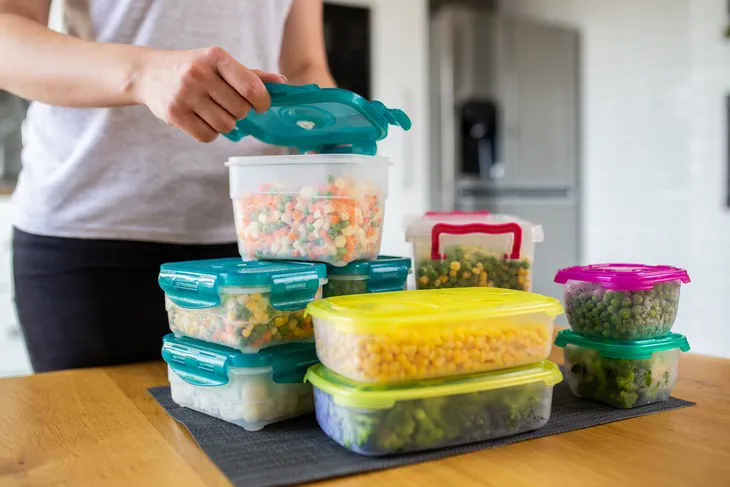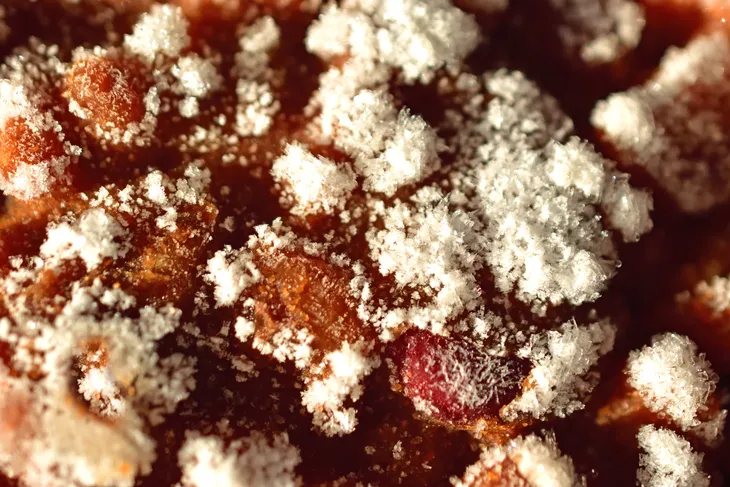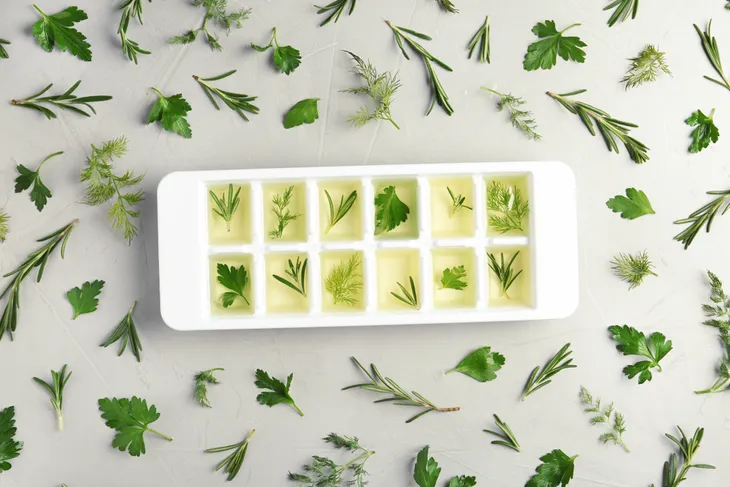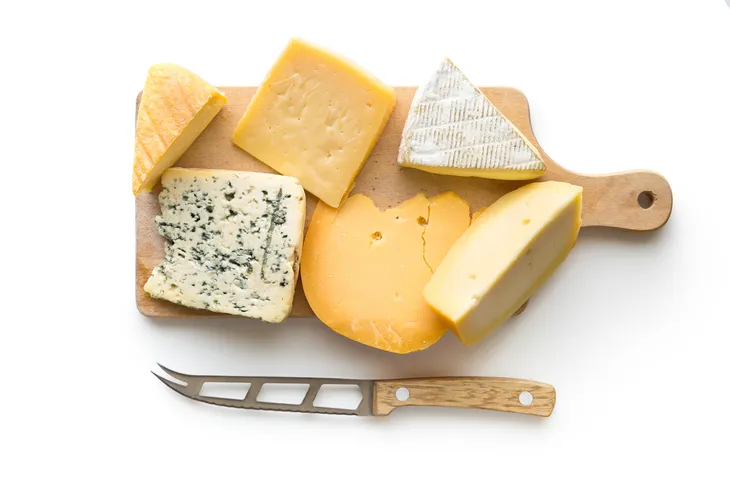- Freezing food is an amazing tool for food preservation, but how do we know when it’s gone bad or how long it’ll last?
- Technically frozen food doesn’t expire, however there are limitations. Food that is frozen for too long will eventually break down in flavor and texture.
- You should try to consume it in a reasonable amount of time, store it in an airtight container, and keep the freezer at 0-degrees Fahrenheit or lower.
Unfortunately, food waste is a common occurrence in many households. While it’s not done on purpose, it can easily be avoided with more mindful shopping (i.e. making grocery lists and food planning), but also by just using the freezer! A lot of the foods we use on a daily basis can be frozen to preserve their shelf life. From meat to vegetables, it’s a great way to avoid wasting food.
Freezing food is an amazing tool for food preservation, but how exactly does it work? How long can it stay in the freezer and how do we know when it’s gone bad? We’ll answer all of these common questions, as well as some tips on how to extend the shelf life of frozen food, what foods to freeze (and not freeze), and most importantly, if we can eat frozen food past its expiration date…
How to Read Expiration Dates
We all know what expiration dates are and probably use them a lot when shopping for food. People tend to look for farther expiration dates so they can get the most out of their purchase. Or use them when cleaning out the fridge and toss anything past its expiry date. Turns out, we might not have to look at it so closely. According to Healthline, manufacturers in the U.S. include a variety of dates on food products, but the only food mandated to include a product date is infant formula.
Food regulations vary in each country, but in the U.S. we tend to see stamps like: “best if used by,” “use by,” “sell by,” or “freeze by.” The most common is “best if used by” which means this is the date it’ll maintain its highest quality, explains the source. “Sell by” is a date the product should try to be sold by so that the customer gets the best flavor and quality. And “freeze by” is a time frame of when a food should be frozen to maintain flavor and quality.
None of these dates are an expiration date, says Healthline, nor do they mean the food will no longer be safe to eat after this date.
Do Frozen Foods Expire?
The short answer to this question is no. Technically frozen food lasts indefinitely. However, it’s important to point out that if you want the food to taste good (which is often an important component of food), you’ll likely want to stay within the parameters of its shelf life. Expiration dates are simply a time frame of how long this food will taste good, because it won’t taste good forever, even if it’s frozen.
Real Simple explains that flavor and texture breaks down over time. Food that is stored in the freezer for an extended period of time won’t go bad, but it will taste off due to freezer burn and drying out. If this happens, don’t throw the food out! Healthline suggests trying to use it in casseroles, baked dishes, or smoothies.
How Long Can They Last?
While there are specific time frames for certain foods, The Kitchn advises following the 3-month rule of thumb. This time frame is for most foods in a standard home freeze before they’ll start showing signs of freezer burn. The source notes there are many factors that can impact how long food will last, including how it’s packaged, how many times the freezer is opened, etc.
If only using a portion of frozen food, be mindful of not introducing bacteria. For example, if using a cup of frozen peas or corn, pour out the portion instead of reaching in. Your hand can introduce bacteria, says Real Simple, and while bacteria won’t grow in the freezer, it can survive.
How to Avoid Freezer Burn
Freezer burn is a thorn in the side of anyone who uses a freezer. We’ve all encountered it at some point and had it ruin one or two meals in the past. While anything will develop freezer burn if it sits in an ice box for too long. However, there are some things we can do to minimize it, especially within the time frames that food should last in the freezer.
The first thing is to make sure your freezer is set at 0-degrees Fahrenheit or lower. “Food freezes faster at this temperature, allowing smaller ice crystals to form,” writes Healthline. Small crystals are less likely to change the quality of food than large crystals. You also want to make sure the food is packaged properly to limit oxygen exposure. Remove as much air as possible from any packaging and use small containers to minimize empty space when freezing leftovers.
Another easy thing to do is limit the amount of times the freezer is opened. Constant opening and closing of the freezer can cause the temperature inside to fluctuate and more ice crystals form when the food starts to thaw. Lastly, try to eat frozen food in a timely manner. Healthline recommends only shopping 2 to 4-months ahead.
Steps to Keep Frozen Food Safe
This one might seem obvious, but it’s a key component to keeping frozen food safe. Frozen food needs to to be kept at or below 0-degrees Fahrenheit, says Healthline. This will maintain not only the quality of the food and shelf life, but it’s also an important safety measure. If it is able to reach below this temperature, it might not be safe to eat.
Healthline provides some steps on how to keep frozen food safe which include having a thermometer in the freezer to ensure the temperature is right. Avoid placing food that is warm in the freezer. Always let it cool first before placing it in the freezer. You should also try to limit the amount of times the freezer is opened.
How to Freeze Meat
Freezing food is a great way to fight food waste. Once moved into the freezer, a lot of foods can be stored in there for months at a time. However, the length of time food can be stored in the freezer all depends on proper storage. Keeping air away from the food and a nice cool temperature is key. The temperature it’s stored at must be 0-degrees Fahrenheit or lower, warns Healthline.
If you’re planning on putting meat (fish and poultry included) in the freezer, try to do it raw. According to Healthline, it’ll last much longer if frozen raw because there is more moisture in raw meat than when it’s cooked. You can certainly put cooked meat in the freezer, but it’s more likely to dry out after a long period of time.
Here is a list of meats that can be frozen, including the length of time they can be stored while maintaining quality and freshness (at 0-degrees Fahrenheit):
- Casseroles and TV dinners: 12 months
- Raw or ground beef and pork: 3-4 months
- Whole chicken or turkey: 12-months
- Cured or processed meat (bacon, sausage): 1-2 months
- Cooked fish: 4-6 months
- Raw steaks or roasts: 4-12 months
How to Freeze Vegetables
When it comes to fruits and vegetables, the shelf life will vary based on how the food was prepared, packaged and stored. “Some vegetables like cabbage, potatoes, celery, and cucumbers don’t freeze well at all. The high water content makes them mushy once thawed,” writes the source. Most fruits and vegetables can last 8 to 12-months in the freezer (if stored properly).
You should also avoid dumping all different kinds of fruits and vegetables together. Separate them all when freezing. If possible, freeze them in a single layer on a sheet tray first. “Allow them to fully harden (24-hours should do it), then transfer everything to a single baggie or storage container,” explains Real Simple. This helps avoid having all the fruits stick together. You’ll actually be able to grab one single strawberry out as opposed to a big freezer-burnt blob.
How to Increase Shelf Life of Frozen Foods
Obviously the quality of the food itself will impact how long it will last. As we now know, food can last a lot longer if we freeze it. While it can last indefinitely, there is still a shelf life in terms of how long it will taste good. Thankfully, there are some things we can do to try and extend this shelf life.
To start, prepping, packaging, and storing the food correctly will help keep it from spoiling. The main thing we want to do is limit air exposure to avoid a build up of ice crystals in the food, explains Healthline. A good way to do this with vegetables is by blanching them. This helps preserve their nutritional value, color, taste, and texture. “To blanch a vegetable, submerge it in boiling water for a short period of time, then quickly place it in ice-cold water to stop the cooking process,” writes Healthline.
Other important things to do are to store it in a vapor-resistant, airtight container or package. The key is to avoid or limit exposure to air or odors that can impact the flavor of the food. You also want to freeze food as quickly as possible to avoid a build-up of ice crystals. These ice crystals will dry the food out when it’s thawed. Healthline advises spreading the food out in an even layer so that it freezes faster.
Signs Frozen Food Has Gone Bad
Unlike fresh foods, it’s not as obvious when frozen food has gone bad. However, there are a few key signs involving smell, texture, color, and of course, freezer burn. It will become more apparent once the food is thawed as to whether or not it’s gone bad. Give it the classic sniff test. If it smells foul or rancid, it’s best to just toss it. You can also tell by texture. Food that is mushy or slimy is a good indicator of spoilage by bacteria, warns the source.
According to Healthline, bad frozen food will usually have some freezer burn on it. This happens when the frozen food is exposed to air. While food with freezer burn is safe to eat, it’ll likely be dry, lack flavor, and have a less than desirable texture. “If only small sections of the food are freezer-burned, you can just cut off the freezer-burned portions and eat the rest,” writes the source.
Lastly, color can potentially be an indicator. This sign on its own isn’t enough as many foods will change in color when they are frozen. However, Healthline points out that any fading or darkening of color in addition to a change in smell and texture can indicate spoilage.
Foods You Didn’t Know You Can Freeze
There are lots of obvious foods we’d find in the freezer of most people’s homes. There would likely be some meat, a frozen pizza, ice cream, frozen fruit and vegetables, and possibly even some prepped meals! While there are some foods that don’t bode well in the freezer, there are many people likely don’t even realize they can freeze.
Growing fresh herbs but don’t need to use them right away? Place two tablespoons of the herbs along with some water in an ice cube tray and freeze them. You can add these cubes directly to sauces, soups and stews. Super easy! Other cooking staples that can be frozen are garlic, butter, flour, citrus zest, and raw egg whites! Eat This, Not That warns not to freeze cooked egg whites as the whites will crystallize. But if they are raw, it works just fine!
Other foods that people might not realize do well in the freezer are avocados, buttermilk, bacon, and fresh pasta. Just freeze it on a sheet pan first for about 20-minutes until it’s firm (the same goes for garlic), then transfer it to a freezer-safe bag or container, says the source.
Foods You Shouldn’t Freeze
While the list of foods that can be frozen is long, there are some foods that shouldn’t be kept in the freezer either for safety reasons or simply because they don’t preserve well. According to Chatelaine, opened dairy products, such as milk and yogurt, as well as fresh eggs and egg substitutes should not be kept in the freezer.
Other foods to avoid freezing are soft cheeses, such as brie, cottage cheese, or ricotta. Similarly, meals that contain a lot of mayonnaise like potato or macaroni salad won’t preserve well in the freezer. “You shouldn’t freeze salad that contains mayonnaise — freezing causes the emulsion of eggs and oil to break when it thaws, leaving you with an oily mess,” writes the source.
How to Thaw Frozen Foods Safely
We’ve talked a lot about all the rules and safety tips surrounding freezing food, but what about the thawing food? This part of the process is arguably even more important as it can either ruin the food or worse, cause illness if it’s not thawed properly. Thawing is mostly used for meat, poultry and seafood since most vegetables can be used without thawing first, says Eat Right (Academy of Nutrition and Dietetics).
You should never leave meat out of the refrigerator for more than two hours or even an hour because if the temperature is hotter than 90-degrees, bacteria can multiply rapidly, warns the source. Always thaw in the fridge either for an entire day or overnight. If doing this, place the frozen food on a plate or in a container to catch any juices that might leak. Keep it on the bottom shelf in the fridge so it doesn’t contaminate any other food.
Another method is to thaw in cold water. This is faster than thawing in the fridge, but it can still take several hours depending on the size of the meat. Eat Right suggests placing the item in an airtight plastic bag or container, submerge it in cold water (change the water every 30-minutes), and then cook immediately after it has thawed.
To thaw in the microwave, remove any plastic. Place it in a microwave-safe container and cover. Follow microwave instructions on how to defrost and cook immediately afterwards. If you don’t have enough time to thaw frozen food it is possible to cook it from frozen. Just know the cooking time will be about 50-percent longer than if the food is fully thawed.
